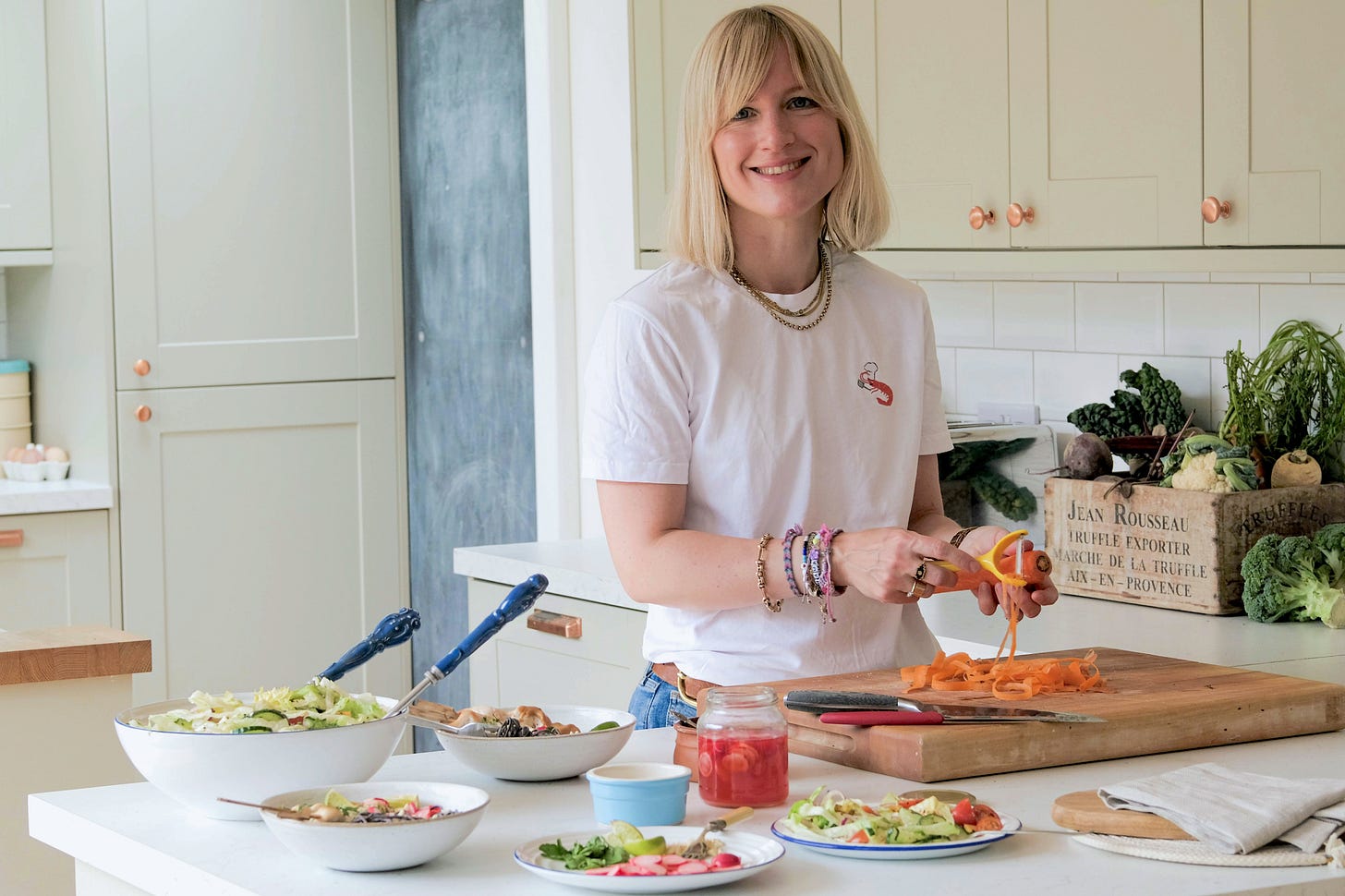Ready to hit reset?
The impact of perimenopause on your oral health, how to prevent UTIs, plus Blueberry, Courgette & Lemon Muffins.
Over the summer it’s easy to let healthy eating habits slip (and that’s nothing to feel guilty about), but September is a great time to hit reset and get back into a routine. While you may not be able to control the changing seasons, you do have the power to make simple, positive steps towards building habits that last. But where to start?
If you’re feeling confused about how to get back on track, but are feeling motivated and ready to take charge of your health, I’m excited to offer 30% OFF my 3-month Revitalise Package to those of you who sign up in September. I have limited availability, so please don’t hesitate to reach out for a free 1-to-1 chat — I’d love to hear from you!
In this month’s Midlife Bites, I take a look at the less talked about perimenopause symptoms — we’ve all heard about the sleep issues, hot flushes and mood changes, but what about the impact on oral health and what can we do to reduce the risk of UTIs? I give my top tips for supporting your health through these concerns. The recipe this month is a great grab-and-go blueberry, courgette & lemon muffin — perfect for after-school snacks or pre-breakfast bite if you’re rushing out the door.
For paid subscribers, I look at whether aches and pains may be a sign of perimenopause and delve into the latest research that suggests that 70% of perimenopausal women will experience musculoskeletal symptoms; plus my top alternatives to coffee that won’t leave you feeling anxious, give you the jitters or interfere with your sleep.
As always, I’d love to hear from you if you’re interested in working together, or if you have any questions, comments or feedback.
How does perimenopause affect your oral health?
Have you heard of ‘burning mouth syndrome’ (BMS or glossodynia)? It’s a feeling of burning, pain or tenderness inside your cheeks, or on your lips, tongue, gums or roof of your mouth; in perimenopause, it may also involve loss of taste. Although nobody really knows the cause of BMS, potential triggers include stress, anxiety, damage to nerves and hormone changes, including declining oestrogen. With up to 15% of women in menopause experiencing BMS, it’s actually a fairly common symptom and can either last a few months or be a longer-term issue. Drinking plenty of water and avoiding irritants such as spicy food, alcohol or caffeine may help — the jury’s out on whether HRT is beneficial for relieving BMS symptoms, with research showing both positive and inconclusive findings.
BMS is just one of a host of oral symptoms that have been linked with perimenopause. A recent survey of more than 1,000 women found that 84% of women over 50 were unaware of the connection between menopause and oral health; and nearly 90% were unaware of the specific oral health risks related to menopause, including increased tooth decay, increased risk of gum disease, impact on jaw density and tooth loss. 35% of women surveyed also said their skincare, hair, or makeup routine is more extensive than their oral health routine, so it may be wise for us all to pay a bit more attention to what’s going on in our mouths.
The NHS lists sensitive teeth, painful gums or other mouth problems as symptoms of menopause, but why might we start to experience these symptoms if we’ve never really had dental issues before? The effect of oestrogen fluctuations on oral health can be split into three categories.
Firstly, saliva plays a key role in whether we experience oral issues as it’s involved in processes such as chewing food, lubricating the mouth, aiding digestion and protecting teeth; with diminishing levels of oestrogen, levels of saliva may change, potentially leading to dry mouth, increased plaque on teeth and inflamed gums.
Secondly, the oral mucosa (that lines the mouth) has many functions including protecting against bacterial infection, building immunity and supporting digestion. Changes in oestrogen levels may affect the integrity of this lining, increasing the risk of inflammation, tooth decay and disrupt the healthy balance of bacteria in the mouth.
Finally, falling oestrogen may also impact teeth by affecting gum tissues (where gums may begin to recede) and reducing bone mineral density and bone mass (hello osteoporosis!), which may lead to tooth loss. In addition to these issues, gum disease may also increase the risk of other health conditions such as heart disease, diabetes, stroke, certain cancers and arthritis. If you’re predisposed to dental issues, due to genetics or previous health history, you may find you’re more prone to these symptoms during perimenopause.
So what can you do to keep your mouth and teeth strong and healthy? Get the basics right. Make sure to brush twice a day, floss once a day and visit your dentist regularly. Try to follow a healthy diet that’s low in sugar, limit the caffeine and alcohol and stay hydrated. Don’t be afraid to communicate with your dentist about your perimenopause symptoms and if you’re worried about anything, make sure to get your teeth checked out.
If you’ve been experiencing symptoms and you’re not sure whether they’re linked to perimenopause, please do get in touch as I’d love to work with you to get to the root cause of your issues.
To prevent menopausal UTIs
Do you constantly feel like you’re running to the toilet? You’ve started getting abdominal pains? Or you’ve been feeling pain or burning when you pee? 50% of women are reported to experience a Urinary Tract Infection (UTIs) at least once in their lifetime and perimenopause may make you more susceptible. Hormonal changes affect the urinary tract, making the tissues around the bladder and urethra thinner and more sensitive. These changes disrupt the delicate balance of bacteria increasing the risk of bacterial infections causing UTIs. You may also be unable to empty your bladder as well as you used to as the bladder loses elasticity, which may again lead to bacterial infection. If you suspect you have a UTI and your symptoms persist, you should visit your doctor as treatment is usually antibiotics. Here are three tips to adopt to help reduce the chances of getting a UTI:
Stay hydrated: As well as supporting your general health, drinking more water has been shown as an effective way to prevent UTIs, as it increases urine which potentially flushes out any non-beneficial bacteria, reducing the risk of infection.
Include probiotic-rich foods: New research shows that urinary tract health should be viewed in the context of vaginal and gut health, where supporting the microbiome of all three ecosystems may be beneficial. Probiotic foods help to maintain a healthy balance of bacteria in the gut and vagina and may reduce the risk of UTIs by preventing the overgrowth of harmful bacteria. Try to include yoghurt, kefir, sauerkraut, kimchi, and other fermented foods as part of your diet.
Eat more fibre: Fibre provides a food source for the beneficial bacteria in your gut, helping to support a healthy microbiome and in turn a healthy urinary tract microbiome, reducing the risk of UTIs. Include a variety of fruit, veg, wholegrains, beans, lentils, nuts and seeds.
If you’re interested in working with me on a 1-to-1 basis, why not book a complimentary chat to find out more about how I can support you through perimenopause. And if you’re on Instagram, come and say hi.
Blueberry, Courgette & Lemon Muffins
Makes 12 | Time: 25 minutes
Sometimes life means you’re having to grab a snack between meals — there’s not enough time for breakfast during the morning school run chaos, or you’re between meetings and need something to keep you going — so choosing something homemade, that you’ve already batch cooked, makes life a lot easier. These muffins are sweetened with banana, have courgette for added veg, Greek yoghurt for extra protein and olive oil and chia seeds for healthy fats; the courgette also keeps the texture deliciously moist. Team with the winning combo of blueberries and lemon zest and you have a great grab-and-go snack that’s heaps better for you than something out of a packet (they’re also a hit with the kids for the daily after-school demands of “SNACK, please!”). These muffins can be made ahead and frozen for up to 3 months.
INGREDIENTS
1 courgette, grated
140g self-raising flour
80g porridge oats
1 teaspoon baking powder
½ teaspoon bicarbonate of soda
1 teaspoon Ceylon cinnamon
2 tablespoons chia seeds
1 lemon, zested
1 banana
2 eggs
70ml olive oil
240g Greek yoghurt
100g frozen blueberries
METHOD
Preheat the oven to 180C (fan). Line a muffin tray with silicone liners (or grease). Place the grated courgette between some kitchen paper and squeeze out as much of the liquid as possible; set aside.
In a large bowl, mix together the flour, oats, baking powder, baking soda, cinnamon, chia seeds and lemon zest.
In another bowl, mash the banana, then whisk in the eggs, olive oil and Greek yoghurt.
Add the wet ingredients to the dry ingredients, being careful not to over-mix.
Stir in the grated courgette and the blueberries.
Divide the mixture between the 12 muffin cups and place in the oven for 20 minutes, or until golden.
Once cooked, cool in the tin for 5 minutes before placing on a wire rack.
Are aches & pains a sign of perimenopause?
Have you noticed more aches and pains, soreness, frozen shoulder, stiffness or loss of balance since your late 30s or in your 40s, without any obvious reasons for it?
Keep reading with a 7-day free trial
Subscribe to Midlife Bites to keep reading this post and get 7 days of free access to the full post archives.












